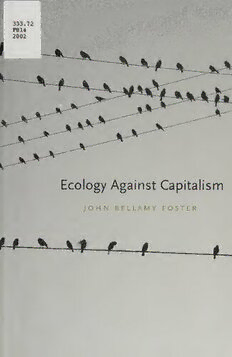
Preview Ecology Against Capitalism
Ecology Against Capitalism OHN BELLAMY FOSTER ^—~V-f— Ecology Against Capitalism Digitized by the Internet Archive in 2020 with funding from Kahle/Austin Foundation https://archive.org/details/ecologyagainstcaOOOOfost if |; % Ecology Against Capitalism JOHN BELLAMY FOSTER © MONTHLY REVIEW PRESS New York Copyright © 2002 by MONTH LY REVIEW PRESS All Rights Reserved Library of Congress Cataloging-in-Publication Data available from the publisher. isbn: 1-58367-056-4 paperback — isbn 1-58367-055-6 hardback MONTHLY REVIEW PRESS 122 West 27th Street New York, NY 10001 Printed in Canada 10 987654321 A shorter version of “Ecology Against Capitalism” first appeared in Monthly Review 53:5 (October 2001); "The Ecological Tyranny of the Bottom Line,” Richard Hofrichter, ed., Reclaiming the Politics of Health: Environmental Debate in Toxic Culture (Cambridge, M A: MIT Press, 2000); “Global Ecology and the Common Good,” Monthly Review 46:9 (February 1995); “Ecology and Human Freedom,” Monthly Review 47:6 (November 1995); “Let Them Eat Pollution,” Monthly Review 44:8 (January 1993); “The Scale of Our Ecological Crisis,” Monthly Review 49:11 (April 1998); “Sustainable Development of What?” first published as the preface to the Korean edition of The Vulnerable Planet; English translation, Capitalism, Nature, and Socialism 7:3 (September 1996); “Globalization and the Ecological Morality of Place,” The Long Term View 3:3 (Fall 1996); “Capitalism’s Environmental Crisis— Is Technology the Answer?” Monthly Review 52:7 (December 2000); “The Limits of Environmentalism without Class,” Daniel Faber, ed., The Struggle for Ecological Democracy: Environmental Justice Movements in the United States (New York: Guilford Press, 1998); “Malthus’s Essay on Population at Age 200,” Monthly Review 50:7 (December 1998); “Liebig, Marx, and the Depletion of Soil Fertility,” co-authored with Fred Magdoff, in Fred Magdoff, John Bellamy Foster, and Frederick H. Buttel, ed., Hungry for Profit: The Agribusiness Threat to Farmers, Food, and the Environment (New York: Monthly Review Press, 2000). Contents PREFACE 7 Ecology against Capitalism 9 The Ecological Tyranny of the Bottom Line: The Environmental 26 and Social Consequences of Economic Reductionism Global Ecology and the Common Good 44 Ecology and Human Freedom 52 “Let Them Eat Pollution”: Capitalism and the World Environment 60 The Scale of Our Ecological Crisis 69 Sustainable Development of What? 79 Globalization and the Ecological Morality of Place 83 Capitalism’s Environmental Crisis—Is Technology the Answer? 92 The Limits of Environmentalism without Class: Lessons from the 104 Ancient Forest Struggle in the Pacific Northwest Malthus’s Essay on Population at Age 200 137 Liebig, Marx, and the Depletion of Soil Fertility: 154 Relevance for Today’s Agriculture 170 INDEX Preface The argument of this book is that the realms of ecology and capitalism are opposed to each other—not in every instance but in their interactions as a whole. This approach is distinguished from those that attribute the present global ecological crisis largely to fixed human nature, modernity, industri¬ alism, or even economic development per se, in that it offers reasonable grounds for hope that our most serious environmental problems can be overcome without abandoning the prospect of human progress—but only if we are willing to carry out fundamental social change, in such a way as to make a more sustainable relation to the environment possible. The chapters that make up Ecology Against Capitalism were originally written as separate essays in what amounted to a running critique of mainstream economic approaches to environmental crisis under capital¬ ism, conducted over the years 1992-2001. The writing of this book occurred during the same period in which I was doing the research and writing for The Vulnerable Planet: A Short Economic History of the Environ¬ ment (1994. 1999), and Marx’s Ecology: Materialism and Nature (2000). There is, however, little duplication between these three works, which are meant rather to complement each other. The Vulnerable Planet provided a brief historical sketch of ecological degradation from precapitalist soci¬ eties up to the present. Marx’s Ecology began the difficult task of unearthing the legacy of materialist understandings of nature and ecologi¬ cal crisis, taking the story up to the deaths of Darwin and Marx in 1882- 1883. (I am now working on a further volume that will carry the story forward.) Ecology Against Capitalism, as distinct from these other works, is less concerned with providing a single historical narrative, and instead represents an attempt to intervene directly in contemporary political-eco¬ nomic debates on capitalism and the environment—in the process touch¬ ing on such concrete issues as the spotted owl, the export of hazardous wastes, and global warming. 7 ECOLOGY AGAINST CAPITALISM Naturally enough, those persons to whom I am most deeply indebted, since they consist of many of my closest friends and colleagues, overlap with those whose support I acknowledged in my two previous books on ecology, leaving me doubly and triply grateful in some cases. I wish to thank Paul Burkett, Carlos Castro, Brett Clark, Michael Dawson, Michael Dreiling, Barbara Epstein, Daniel Faber, Chuck Hunt, John Jermier, Vicki Larson, Fred Magdoff (who co-authored one of the essays in this book), Harry Magdoff, Bob McChesney, David Milton, Claude Misukiewicz, Jason Moore, Andrew Nash, James O’Connor, Ira Shapiro, John Simon, Paul Sweezy, Victor Wallis, and Michael Yates. To my family, Bill Foster, Laura Tamkin, Saul Foster and Ida Foster, I owe the discoveries of daily life and a constantly renewed sense of wonder. Ecology Against Capitalism is dedicated to Paul Sweezy and Harry Magd¬ off, who have never doubted that the present as history is open, to be made or unmade through human struggle, though not entirely under conditions of our own choosing.
